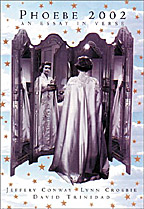 Jeffery Conway, Lynn Crosbie, and David Trinidad
Jeffery Conway, Lynn Crosbie, and David Trinidad
Turtle Point Press ($21.95)
by Steven Moore
Even less than the epic itself, the mock-epic is not a popular form for poets today; indeed, it would be hard to match, much less improve on, the great mock-epics of Alexander Pope, "The Rape of the Lock" and "The Dunciad." Twenty-five years ago, Richard Nason had a go at A Modern Dunciad, but no one will ever touch the utter perfection of Pope's "Lock." Undaunted, three poets decided in early 2000 to pool their talents to write a mock-epic on All About Eve, Joseph L. Mankiewicz's 1950 film about ambition and betrayal in the theater world. As unlikely a topic for a poem as the snipping of a lock of a girl's hair, perhaps—but the challenge of mock-epic is to spin straw into gold, and our three poets have discovered a goldmine in that old movie.
The scope is the literary equivalent of Super Panavision: Phoebe 2002 is an oversized volume 650 pages long, divided into 16 books, with 30 pages of source notes and a number of stills from the movie. The text is an overflowing prop box of verse forms and styles: lines of various lengths and stanzas; poems reviving old genres like the ghazel, double sestina, villanelle, various acrostics, and the 17th-century emblematic poem (here we have poems in the shape of a champagne glass, an Oscar trophy, and one illustrating the contrasting bust shapes of two actresses); letters, lists, quizzes, recipes, plays, extended quotations from such books as Mommy, Dearest and Craig Nelson's Bad TV; and lots of parodies (including a hilarious one of the Ouija board pronouncements from James Merrill's The Changing Light at Sandover).
In proper epic form, the poets announce their theme early on: "All About Eve is a Creation story which deploys deep literary and iconic tropes: it is also an analogue for film and television; a treatise on fame; and an exposition about women and aging, women and sexuality: 'women . . . and their men!" The line break here is the only indication that these particular lines are poetry rather than prose; it must be said that this "essay in verse" reads more like essay than verse in many places, despite the panoply of poetic forms. But the poets are ingenious at uncovering those "deep literary and iconic tropes": Eve's name evokes Milton's Paradise Lost, of course, and the smoke-filled opening scene of the movie Dante's Inferno. And they go far beyond whatever tropes Mankiewicz intended to find parallels in an encyclopedic range of other writers (Spenser, Byron, Baudelaire, Dickinson, Eliot, et al.). At times it's like a DVD audio commentary by the oral examination committee for a doctorate in literature.
The "treatise on fame" angle leads the poets to examine the celebrity culture and geeky fandom that was emerging around the time of All About Eve, thanks to columnists like Walter Winchell, and which has assumed such ghastly proportions in our time, not only in movies and music but in poetry, where ambition and betrayal also rear their ugly heads. Phoebe 2002 becomes more personal in the last third of the book as our poets share horror tales of their fellow poets, and the 9/11 attack during the composition of the book casts the whole project into triviality, as they're the first to admit. But also knowing that good work is the only antidote to scheming poets and uncontrollable tragedies, the authors soldier on and bring their mock-epic to a satisfying conclusion.
If Phoebe 2002 doesn't sweep every poetry award this year, it will be as unjust as Bette Davis's failure to win an Oscar for All About Eve. The endless creativity on display here, the deep erudition, the Talmudic ingenuity, and the sense of fun against all odds make this the most impressive book of poetry I've read in years. As the movie's theater critic Addison De Witt says, I am once more available for dancing in the streets.
Click here to purchase this book at your local independent bookstore

Rain Taxi Online Edition, Winter 2003/2004 | © Rain Taxi, Inc. 2003/2004
